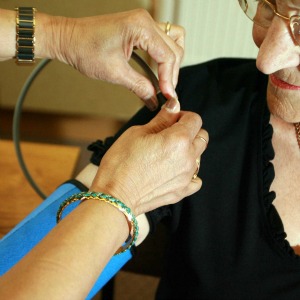Exclusive The NHS Health Check programme could be costing more than twice as much as an opportunistic approach to diagnosing people with conditions such as hypertension, leaving GPs out of pocket, research has suggested.
A team from the University of Exeter found it cost one practice nearly £550 for each new diagnosis of hypertension through an NHS Health Checks clinic, when it could have cost them less than £230 through opportunistic testing.
Dr Chris Clark, a GP in Devon and a clinical academic fellow at the university, who led the research, said the high costs associated with running the Health Check clinics also meant the practice was running the service at a loss.
GP cardiology experts said the results showed an opportunistic approach to screening would be more cost-effective than the blanket, age-based screening approach used in the NHS Health Check programme and urged Public Health England to rethink the policy.
The NHS Health Check programme was introduced in 2009 with the aim of reducing cardiovascular mortality and morbidity in England. Under the scheme, all patients aged 40 to 74 years without a diagnosis of cardiovascular disease, diabetes or chronic kidney disease are invited to the clinic for a 30-minute face-to-face appointment, where they have their blood pressure and other clinical measurement such as cholesterol levels taken as well as lifestyle history.
Related stories
NHS Health Checks programme stalling amid poor uptake and critical MPs’ report
However, academics and clinicians have criticised the evidence base for the approach and one leading epidemiologist and Public Health England advisor has recommended a more targeted approach to screening.
For the study, Dr Clark and colleagues looked at the costs associated with 278 patients invited to a nurse-run Health Check clinic at one rural practice, of whom 86 (31%) attended their check-up.
In all, 26 patients required follow-up for an initial elevated blood pressure and of these six did not re-attend, while hypertension was confirmed in seven patients.
The cost per patient diagnosed was £548 – an additional £318 compared with the estimated cost per patient for detecting the same seven cases through an opportunistic approach.
The researchers concluded: ‘Replication of this finding from larger numbers of practices may challenge one of the cost-effectiveness assumptions of the NHS Health Checks programme.
‘Primary care resources may be better utilised with opportunistic approaches to the detection of hypertension.’
Dr Clark explained to Pulse that half the confirmed cases of hypertension already had high blood pressure readings on file that could have been followed up more aggressively, while opportunistically testing patients would pick up other high-risk patients.
Dr Clark said: ‘I went back through the records of people who were found to have a high blood pressure reading and of those with confirmed hypertension, 43% had previous high readings on file that we hadn’t responded to.’
He added: ‘We’re still meant to measure people’s blood pressure every five years through QOF and through other contractual work we will be picking people up. In monetary terms, we’re saying detecting hypertension a focused or targeted approach would be more cost-effective.’
Dr Clark said the clinics were also costing more than the £24 paid per completed health check, largely down to the costs associated with nurses and GPs running the clinic.
He said: ‘Practices might be interested to add up what they are spending on this process and look at how much they are earning because the two might not necessarily correlate.’
Dr John Ashcroft, Derbyshire LMC medical secretary and a GPSI in cardiology, said the study underscored earlier evidence supporting a targeted screening approach.
Dr Ashcroft said: ‘To risk assess everyone [aged] 40 to 75 was always going to be an expensive approach. So many patients we know are not going to be risky before they walk through the door, from our QOF.
‘This should have been targeted much more effectively by using the data on GP systems as a result of taxpayers’ investment into QOF, to identify those who were likely to be at high risk.’
He added: ‘Probably only half the number of assessments would be needed with this approach. It would be much more sensible to go back to this and the money saved could go towards paying for the management of patients on statins and also for those with prediabetes.’
Jamie Waterall, PHE national lead for the NHS Health Check programme, said: ‘The NHS Health Check falls well within NICE cost effectiveness thresholds. Checking for hypertension is important but it is only a part of the NHS Health Check, which is designed to assess people’s risk of developing vascular disease, followed by discussion and personalised advice and support to help them reduce or manage that risk. Local authorities commission the programme in ways that best suit their needs and for many this already includes some opportunistic testing.‘
Pulse July survey

Take Pulse’s July survey and have the chance to win a Samsung Smart TV.
The survey covers a range of areas, from prescription charges to mental health, and discrimination to PMS reviews.
Visit Pulse Reference for details on 140 symptoms, including easily searchable symptoms and categories, offering you a free platform to check symptoms and receive potential diagnoses during consultations.

















